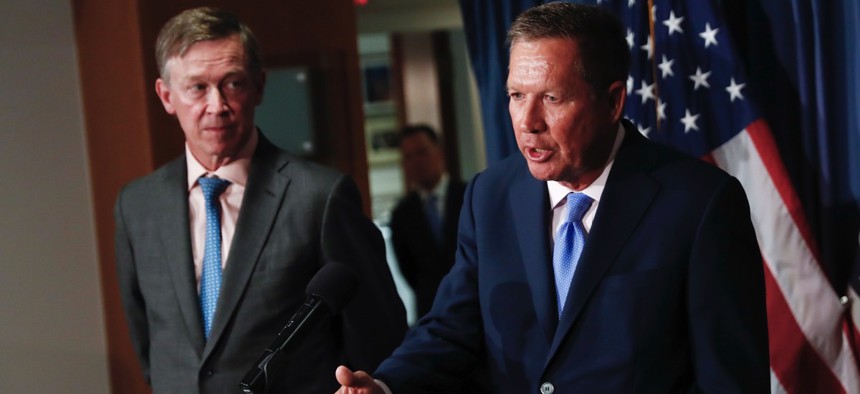Governors Want Room to Shape Health Care Innovation

Ohio Gov. John Kasich, right, and Colorado Gov. John Hickenlooper introduce the first version of their bipartisan health blueprint in the summer of 2017. Carolyn Kaster / AP Photo
Ohio Gov. John Kasich and Colorado Gov. John Hickenlooper are making a second, bipartisan attempt at improving Obamacare and affordability.
WASHINGTON — A group of governors led by Ohio’s John Kasich and Colorado’s John Hickenlooper unveiled Friday the second iteration of their “bipartisan blueprint” for improving the U.S. health care system.
Speaking at the National Press Club, Hickenlooper, a Democrat, laid out a framework for addressing “runaway inflation” that would give states greater flexibility in shifting from fee-for-service medicine to volume-based payments and care coordination.
Unlike the governors’ first plan released in the summer, as congressional Republicans attempted to repeal and replace Obamacare, the new set of recommendations avoids talk of cost sharing reductions—discounts on deductibles, copayments and coinsurance—or any costs at all.
“Move the entire system toward using incentives, in every way that we can, to motivate doctors, hospitals, pharmaceutical companies to do more with less,” Hickenlooper said. “To get better outcomes, and I mean that, higher quality outcomes for less money.”
Additionally the blueprint calls for eliminating federal regulations constraining states from making innovative health care reforms and establishing a “floor” for state health systems, one they can flexibly exceed, that maintains coverage.
The federal government is expected to continue to lead when practical on items like pharmaceuticals and air ambulances, but programs shared with states should have governance and incentives aligned. That goes for dual-eligible beneficiaries, who qualify for both Medicare and Medicaid.
When it comes to the State Innovation Models Initiative, the governors seek expedited waivers allowing them to more readily replicate successes like Alaska’s reinsurance program, expected to lower premiums 20 percent in 2018.
Alaska Gov. Bill Walker, Pennsylvania Gov. Tom Wolf, and Nevada Gov. Brian Sandoval also signed onto the blueprint.
“This is a matter of working not just across party lines but across governmental lines: the federal, state, local communities, the tribal,” said Walker, an Independent. “In Alaska, our health care costs have come down significantly because of our tribal medicine that’s available there.”
The blueprint warns consolidation among health care providers stymies competition and innovation, necessitating new business, technology and workforce models in addition to increased data sharing across silos.
Businesses will make or break market stabilization, said Kasich, a Republican.
Ohio saved $1.5 billion on Medicaid, and Kasich believes the U.S. can save $1 trillion through tailored changes that give states more control over the program while reducing the national debt. They would further keep the country from moving toward a two-tiered or single-payer system, which he called “terrible.”
“We’re different states: Our state’s getting older. [Colorado]’s getting younger. That’s why we hate him for that,” Kasich joked of Hickenlooper. “But the fact is, give us flexibility.”
Kasich wants to see Sens. Lamar Alexander and Patty Murray’s deal to improve Obamacare passed on a bipartisan basis and supports “reasonable” Medicaid work requirements that exempt the vulnerable. But he wants the welfare system “understood and reinvented.”
Hickenlooper understood frustrations around people “freeloading on the system,” but was more cautious about implementing work requirements.
“The last thing any of us want to do is add a whole new level of bureaucracy to everybody to try and compel a small number of people back into work,” Hickenlooper said.
Colorado legislators are working toward waivers on reinsurance and possibly work requirements, Hickenlooper said, but he wasn’t sure where they were in the process.
The governors intend to keep pushing their blueprint, Kasich said, with Walker the most confident it might be taken up by Congress.
“I do believe that members of Congress want exactly what we’re talking about,” Walker said. “We’re not doing it to be critical of them in any way.”
Dave Nyczepir is a News Editor at Government Executive’s Route Fifty and is based in Washington, D.C.
NEXT STORY: Grand Jury Indicts Missouri’s Governor on Felony Invasion of Privacy






